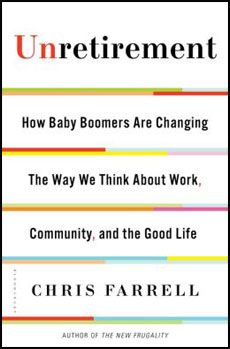"The potential economic payoff from society tapping into the abilities and knowledge of large numbers of people in their sixties and seventies is enormous. The economy will expand, household finances will improve, and fears of a penurious retirement will fade. Living standards will climb and the feared fiscal strain from entitlement spending will ease. The theme of intergenerational warfare will disappear as the shared interests between the generations in a jobcentric [sic] economy take center stage. Of course, a tweak might have to be made to the famous Beatles song 'When I'm Sixty-Four': 'If I'm at work till quarter to ten, would you lock the door?' (The author of the song, Sir Paul McCartney, continues to enjoy a productive career well beyond his sixty-fourth birthday.)
"Peter Drucker, the late philosopher of management, noted that every once in a while society crosses a major divide. 'Within a few short decades, society rearranges itself — its worIdview; its basic values; its social and political structure; its arts; its key institutions,' wrote Drucker in Post-Capitalist Society. 'Fifty years later there is a new world.' The transformation of retirement into unretirement marks such a divide.
"We're at the early stages of a long, difficult transition toward a different vision of the elder years. In the process, aging boomers will influence for the better how younger generations view their jobs, their careers, and their expectations about the mix of work and leisure, engagement and meaning, especially during the last third of life. The tantalizing promise of unretirement for younger generations is realizing they will have much more time to better merge their careers and the search for meaning, to pursue job flexibility and creative variety, over a lifetime. 'Older workers are going to change the workforce as profoundly as women did,' says Deborah E. Banda, senior adviser, AARP Education and Outreach. 'The changes they are making in the work place will benefit all generations, not just older workers.' Eugene Steuerle, economist at the Urban Institute in Washington, D.C., wholeheartedly agreed in an interview at his office: 'Older workers are to the first half of the twenty-first century what women were to the last half of the twentieth century.' "
